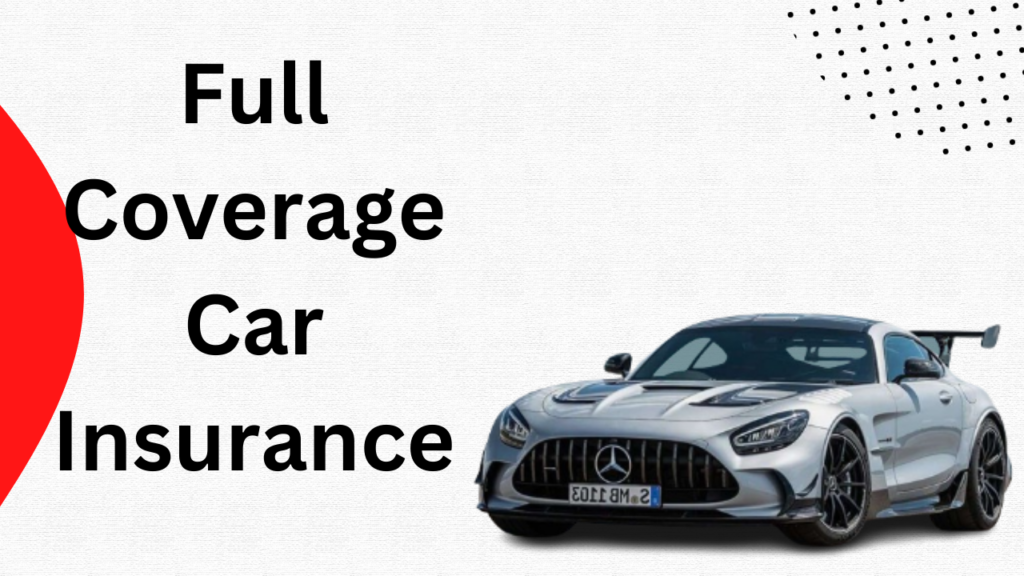Are you looking to safeguard your vehicle and drive with peace of mind? Full coverage car insurance might be the answer you’ve been searching for.
In this blog, we’ll delve into what full coverage entails, explore its cost-effective options, debunk common misconceptions, and help you navigate the world of car insurance with confidence. Let’s rev up our engines and dive into the realm of full coverage car insurance!
What does full coverage mean for car insurance?
When it comes to car insurance, “full coverage” is a term that often gets thrown around.
But what does it really mean? Essentially, full coverage combines different types of auto insurance to provide comprehensive protection for your vehicle. It typically includes liability coverage, which helps pay for damages or injuries you cause in an accident. Additionally, full coverage usually encompasses collision and comprehensive coverage.
Collision insurance covers damage to your car from accidents with other vehicles or objects, while comprehensive insurance protects against non-collision incidents like theft or natural disasters. In short, full coverage offers a more extensive safety net compared to basic liability insurance.
What is the cheapest full coverage car insurance?
Looking for the cheapest full coverage car insurance to protect your vehicle without breaking the bank? You’re not alone! Many drivers are on a quest to find affordable yet comprehensive coverage.
When it comes to finding budget-friendly full coverage, it’s essential to shop around and compare quotes from different insurance providers. Each company offers unique rates based on various factors like your driving record, age, and location.
Consider opting for higher deductibles or bundling policies with the same insurer to potentially lower your overall premium costs. Additionally, maintaining a clean driving history can also help qualify you for discounts and lower rates.
While price is crucial, remember that the cheapest option may not always provide adequate protection in case of accidents or damages. It’s essential to strike a balance between affordability and sufficient coverage tailored to your needs.
What does it mean when your policy is paid in full car insurance?

When your car insurance policy is paid in full, it means you have fully settled the premium for a specific period upfront. This can be a smart financial move as you won’t have to worry about monthly payments or potential lapses in coverage due to missed payments.
Having your policy paid in full can also sometimes lead to discounts from insurance companies as they appreciate the commitment and reduced administrative costs associated with processing frequent payments. It provides peace of mind knowing that your coverage is secured without the hassle of recurring bills.
Moreover, paying your car insurance in full can help improve your credit score by showing responsible financial behavior. It demonstrates reliability and stability to insurers which may result in better rates for future policies.
Opting for a paid-in-full car insurance policy can offer convenience, potential cost savings, and overall financial benefits in the long run.
Why is full car insurance so expensive?
Have you ever wondered why full coverage car insurance comes with a hefty price tag? Well, there are several factors that contribute to its cost.
Full coverage includes comprehensive and collision coverage in addition to liability insurance, which means the insurer is taking on more risk by providing a wider range of protection. This increased coverage naturally leads to higher premiums.
Moreover, the type of vehicle you drive also plays a role in the cost of full car insurance. Luxury cars or sports vehicles typically come with higher repair or replacement costs, leading insurers to charge more for their coverage.
Additionally, your driving history and credit score can impact how much you pay for full coverage. If you have a history of accidents or poor credit, insurers may see you as a higher risk and raise your rates accordingly.
While the expense of full car insurance may seem daunting, it ultimately provides peace of mind knowing that you are fully protected on the road.
What full coverage doesn t cover?
When it comes to full coverage car insurance, it’s important to understand what it doesn’t cover. While the term “full coverage” may suggest comprehensive protection, there are still limitations to consider.
One thing that full coverage typically doesn’t cover is regular maintenance and wear-and-tear on your vehicle. This means expenses like oil changes, tune-ups, and new tires will not be included in your policy.
Another aspect that is often excluded from full coverage is intentional damage caused by the policyholder.
If you purposely damage your own car or engage in reckless behavior leading to an accident, you may not be covered under your insurance plan.
Additionally, some policies do not extend coverage for items stolen from inside your vehicle. Personal belongings such as electronics or valuables are usually not part of the coverage provided by a standard full coverage plan.
It’s crucial to review the specifics of your policy and understand what exclusions apply to avoid any surprises in case of an unfortunate event.
What does full coverage usually cover?
Full coverage car insurance typically includes a combination of comprehensive and collision coverage. Comprehensive coverage helps protect your vehicle from non-collision related incidents like theft, vandalism, or natural disasters.
Collision coverage, on the other hand, pays for damages to your car resulting from collisions with other vehicles or objects.
In addition to these basic coverages, full coverage may also include uninsured motorist protection, which can help cover expenses if you’re in an accident with a driver who doesn’t have insurance.
Personal injury protection (PIP) is another common inclusion in full coverage policies, providing medical payments and lost wages for you and your passengers regardless of fault.
It’s important to review the specifics of your policy as coverages can vary between providers. Some additional options that might be included are rental reimbursement for temporary transportation while your car is being repaired and roadside assistance for unexpected breakdowns.
Do you really need full coverage?

Are you debating whether full coverage car insurance is necessary for you? In the end, it comes down to your personal preferences and circumstances.
Full coverage typically includes comprehensive and collision coverage, providing a broader range of protection compared to basic liability insurance.
If you have a new or expensive vehicle, full coverage can offer peace of mind knowing that damages from various scenarios are covered.
Consider factors like the value of your car, your driving habits, and financial situation when deciding on insurance coverage. While full coverage may come with a higher premium, it can save you money in the long run if an accident occurs.
Think about how much risk you are willing to take on personally versus transferring that risk to the insurance company through comprehensive protection. Research different options and consult with an insurance agent to determine the best policy for your needs.
Does full coverage really cover everything?
When it comes to car insurance, the term “full coverage” can be misleading. While full coverage offers a wide range of protection, it doesn’t necessarily cover every possible scenario that could happen on the road.
Full coverage typically includes liability, collision, and comprehensive insurance. However, there may still be limitations and exclusions within each of these coverage types. For example, full coverage might not cover wear and tear on your vehicle or mechanical breakdowns.
It’s essential to review your policy carefully to understand what is included and excluded from your full coverage plan. Additionally, consider adding supplemental policies for extra protection in areas where your full coverage falls short.
While full coverage provides extensive protection for your vehicle and finances, it’s crucial to be aware of its limitations so you can make informed decisions about additional coverage options that may better suit your needs.
What is the best coverage for car insurance?
When it comes to choosing the best coverage for car insurance, it’s essential to consider your individual needs and circumstances. The best coverage for one person may not be the same for another.
Comprehensive coverage is often recommended as it provides protection against a wide range of risks, including theft, vandalism, and natural disasters. Collision coverage can also be beneficial if you’re concerned about damage to your own vehicle in an accident.
Additionally, uninsured motorist coverage can offer peace of mind in case you’re involved in an accident with a driver who lacks insurance. Personal injury protection is another valuable option, covering medical expenses regardless of fault.
The best coverage for car insurance will depend on factors like your budget, driving habits, and preferences. It’s crucial to assess your needs carefully and consult with an insurance agent to determine the most suitable policy for you.
Does full coverage cover engine failure?
When it comes to full coverage car insurance, one common question that arises is whether it covers engine failure. Engine failure can be a costly and unexpected issue for any driver. In most cases, standard full coverage policies do not typically cover mechanical breakdowns like engine failures.
Full coverage usually includes comprehensive and collision insurance, which primarily focus on damages caused by accidents or external factors like theft or natural disasters. Engine failure is often considered a maintenance issue rather than an accident-related claim, making it unlikely to be covered under a typical full coverage policy.
If you are concerned about potential engine issues, you may want to consider purchasing additional mechanical breakdown insurance or an extended warranty to provide extra protection specifically for your vehicle’s mechanical components.
Always review your policy details carefully and consider discussing specific concerns with your insurance provider to fully understand what is covered under your full coverage car insurance policy regarding engine failures.
Full coverage car insurance cheap

Looking for affordable full coverage car insurance that doesn’t break the bank? You’re not alone in wanting to protect your vehicle without draining your wallet. The good news is that cheap full coverage options do exist if you know where to look and what factors to consider.
When searching for a budget-friendly policy, it’s essential to compare quotes from different insurance providers.
Each company evaluates risk differently, so prices can vary significantly between insurers. Additionally, maintaining a clean driving record and opting for higher deductibles can help lower your premiums.
While cost is crucial, remember that the cheapest option may not always provide the best coverage. It’s essential to strike a balance between affordability and adequate protection for your needs. So take the time to research and find a full coverage car insurance plan that offers both value and peace of mind.
Full coverage car insurance state farm
When it comes to full coverage car insurance, State Farm is a well-known option for many drivers. State Farm offers comprehensive and collision coverage, along with liability protection, uninsured motorist coverage, and more.
With State Farm’s full coverage car insurance, you can have peace of mind knowing that you’re protected in various situations on the road.
State Farm provides personalized service and competitive rates for their full coverage policies. Whether you’re looking for added protection or want to enhance your existing policy with additional features, State Farm has options to suit your needs.
By choosing State Farm for your full coverage car insurance, you can drive confidently knowing that you have a reliable insurance provider backing you up.
With State Farm’s reputation for excellent customer service and efficient claims processing, it’s no wonder why many drivers trust them with their full coverage car insurance needs. Consider reaching out to a local agent today to explore the benefits of getting full coverage through State Farm!
Full coverage car insurance average cost
When it comes to the average cost of full coverage car insurance, there are various factors that come into play. Insurance companies consider your driving record, age, location, type of vehicle, and coverage limits when determining the price you’ll pay for full coverage.
The average cost can vary significantly from one driver to another Insurance rates may be higher for younger drivers or those with an accident history than for older drivers with spotless records.
Searching around and comparing quotes from several insurers is crucial to locating the greatest deals for your particular circumstances. Additionally, taking advantage of discounts such as bundling policies or maintaining a good credit score can help lower your premium costs.
Understanding what influences the average cost of full coverage car insurance can empower you to make informed decisions when selecting a policy that provides adequate protection without breaking the bank.
Full coverage car insurance near me
When looking for “full coverage car insurance near me,” convenience is key. You want a policy that not only provides comprehensive protection but also fits your location. Finding an insurer nearby can offer peace of mind knowing help is just around the corner.
By choosing a local provider, you may benefit from personalized service and quicker response times in case of emergencies. Being able to visit their office in person can also enhance your overall experience with managing your policy.
Additionally, proximity to the insurance company may lead to potential cost savings or discounts based on where you live. Local insurers often understand the unique risks specific to your area, allowing them to tailor coverage options accordingly.
Ensure that when searching for full coverage car insurance near you, consider factors beyond just distance – such as reputation, customer reviews, and the range of services offered by the insurer.
Full coverage car insurance progressive
Shopping for full coverage car insurance, especially with a reputable provider like Progressive, offers peace of mind on the road. With Progressive’s comprehensive policies, you can protect your vehicle and yourself in various situations.
From accidents to theft and even natural disasters, having full coverage from Progressive ensures you’re financially secure.
Progressive’s options for full coverage car insurance cater to different needs and budgets. By choosing the right level of coverage that suits your requirements, you can drive confidently knowing you’re adequately protected.
Additionally, Progressive’s user-friendly online tools make it convenient to manage your policy and make any necessary changes seamlessly.
When considering full coverage car insurance near me, Progressive stands out as a reliable choice with competitive rates. Whether you’re looking for affordable premiums or top-notch customer service, Progressive has options to fit your preferences. So why settle for less when you can have comprehensive protection with Progressive?

No deposit full coverage car insurance
When it comes to car insurance, opting for full coverage can provide you with peace of mind knowing that you have extensive protection. While full coverage may come at a higher cost compared to basic plans, the benefits and added security it offers are often worth the investment.
If you’re looking for affordable options, consider exploring no deposit full coverage car insurance. This type of policy allows you to get comprehensive coverage without having to pay a large upfront sum. By spreading out your payments over time, you can enjoy the benefits of full coverage without straining your budget.
Whether you choose traditional full coverage or opt for a no deposit option, finding the right car insurance plan is essential for ensuring your vehicle’s protection on the road. Remember to compare quotes from different providers and tailor your policy to meet your specific needs.
With the right coverage in place, you can drive with confidence knowing that you’re prepared for whatever comes your way on the road ahead.

